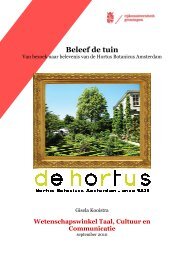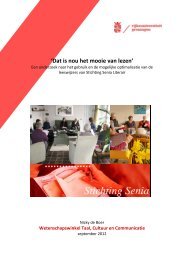Download het boekje - Wetenschapswinkel Taal, Cultuur en ...
Download het boekje - Wetenschapswinkel Taal, Cultuur en ...
Download het boekje - Wetenschapswinkel Taal, Cultuur en ...
Create successful ePaper yourself
Turn your PDF publications into a flip-book with our unique Google optimized e-Paper software.
Foreign Languages - Prestige or necessity?<br />
As m<strong>en</strong>tioned before, multilingualism has become ess<strong>en</strong>tial over the past decades. Especially<br />
the media have a big influ<strong>en</strong>ce on language developm<strong>en</strong>t. TV series and movies from abroad,<br />
the international music industry and social networking all have their effects on language<br />
learning. In times of intercultural communication, it is easier to acquire information from across<br />
the world through the internet. The economy and international trade are based on many<br />
differ<strong>en</strong>t languages and make multilingualism inevitable.<br />
What do our interviewees think about that? All three stud<strong>en</strong>ts said that their opinion about<br />
multilingualism is very positive. Multilingualism is something you cannot avoid; you find<br />
differ<strong>en</strong>t languages and foreign words in advertisem<strong>en</strong>ts, commercials, TV and everywhere on<br />
the internet. According to them, it has become mandatory for their g<strong>en</strong>eration to speak more<br />
than one language. It’s necessary to improve the success in international communication and to<br />
provide a smooth co-exist<strong>en</strong>ce of the differ<strong>en</strong>t people within one nation, but also betwe<strong>en</strong><br />
countries. “Understanding other communities and making integration for foreign people or<br />
immigrants easier are two very important advantages of multilingualism. It also shows respect<br />
and curiosity towards other cultures.” according to Marie.<br />
Another reason the stud<strong>en</strong>ts brought up is the international job market. “Speaking<br />
differ<strong>en</strong>t languages increases your chances to<br />
most of the professions in our society”, says<br />
Kathrin. Furthermore, it is obligatory for<br />
applicants in the cross- cultural field of work.<br />
It shows your abilities to understand other<br />
people better, but according to many<br />
researchers, multilingualism also gives you a<br />
better grasp of your own native language and<br />
linguistic aspects in g<strong>en</strong>eral.<br />
However, there are also disadvantages<br />
that the stud<strong>en</strong>ts are concerned with.<br />
Marie: “Understanding other<br />
communities and making<br />
integration for foreign people or<br />
immigrants easier are two very<br />
important advantages of<br />
multilingualism. It also shows<br />
respect and curiosity towards other<br />
cultures.”<br />
Thinking about getting to know other cultures and societies brought to mind the loss of the<br />
own cultural heritage. One can feel the borders of the own linguistic repertoire become blurry<br />
the more languages one speaks. Closely related to this problem is the mixing of languages, or<br />
the so called code switching. Some linguists argue that code switching impurifies the language<br />
and that it influ<strong>en</strong>ces the language system of the mother tongue negatively. The stud<strong>en</strong>ts said<br />
they did not have the impression that the other languages influ<strong>en</strong>ce their native language, but<br />
they certainly noticed the interfer<strong>en</strong>ce and impact.<br />
The importance of multilingualism is self-explanatory. But is it just used out of necessity,<br />
or can it be used as a sign of higher education and prestige? The choice of language oft<strong>en</strong><br />
displays the character and id<strong>en</strong>tity of a person, but people also t<strong>en</strong>d to adapt themselves and<br />
their behaviour to their <strong>en</strong>vironm<strong>en</strong>t. Talking in dialects, acc<strong>en</strong>ts or styles is not always an<br />
indication of showing off the abilities, but it happ<strong>en</strong>s to many people unconsciously. Marie<br />
described this ph<strong>en</strong>om<strong>en</strong>on as “circumstantial application of the linguistic knowledge”. She<br />
talks High German with her German fri<strong>en</strong>ds, but Swiss German at home and with her Swiss<br />
fri<strong>en</strong>ds without really thinking about the language choice.<br />
53 | W i e g e e n v r e e m d e t a l e n k e n t , w e e t n i e t s v a n z i j n e i g e n t a a l




